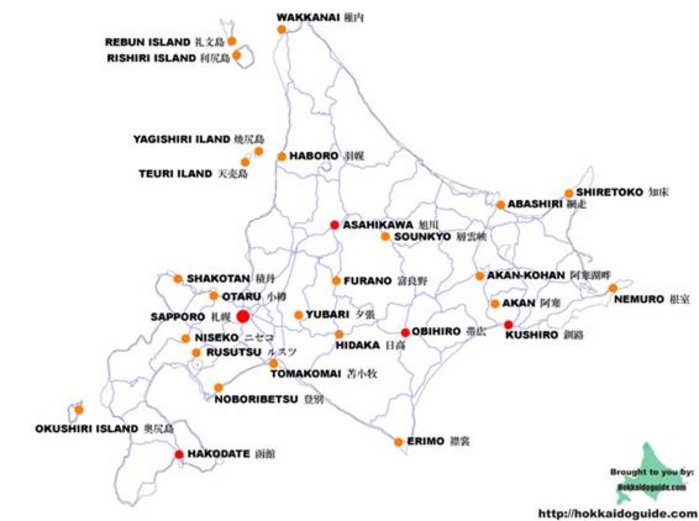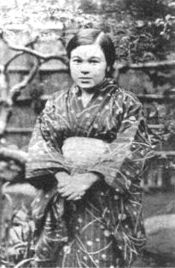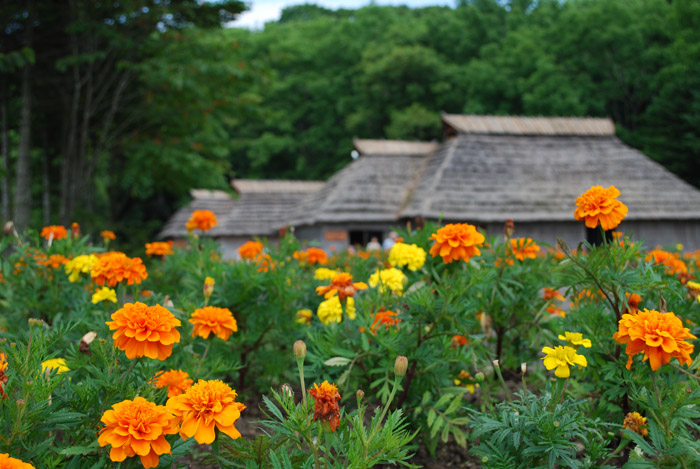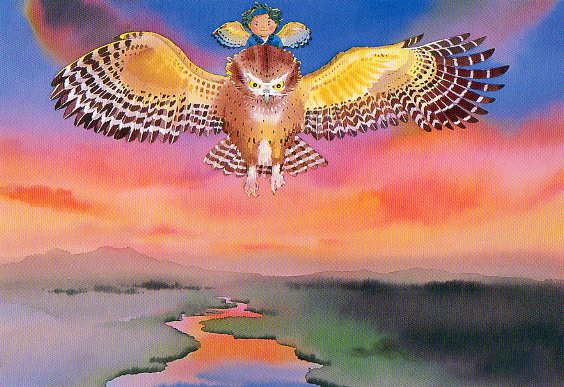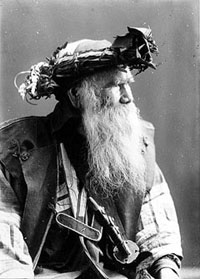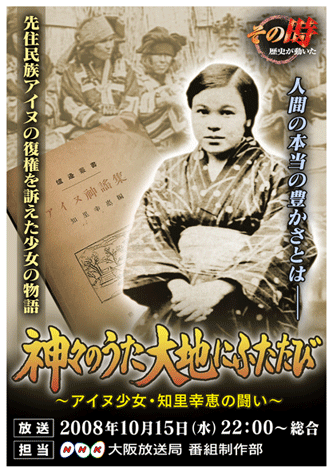The Song the Owl God Himself Sang.
“Silver Droplets Fall Fall All Around,” an Ainu Tale
Kamuichikap kamui yaieyukar,
“Shirokanipe ranran pishkan”
Transliterated in Romaji and Translated from Ainu into Japanese by Chiri Yukie
Translated and introduced by Kyoko Selden
Chiri Yukie (1903-1922) was born in Horobetsu, Hokkaidō, to Chiri Takakichi and Nami. Nami was the daughter of an Hokkaido Ainu grandsire, Kan’nari. Yukie was the older sister of the linguist Chiri Mashiho (1909-1961). When she was five and six years of age, she lived in Horobetsu with her grandmother, the great bard Monasinouk. Yukie grew up listening to recitations in the oral tradition as narrated by Monasinouk and later also by her adoptive mother Kan’nari Matsu, Nami’s sister. Starting in 1909, she and Monasinouk lived with Matsu at the Episcopal Church compound in Chikabumi in the suburbs of Asahikawa. After a total of seven years of normal and higher normal school education, she attended Asahikawa Girls Vocational School for three years, graduating in 1910.
Hokkaido map shows Noboribetsu in the southwest
When the linguist Kindaichi Kyōsuke visited Kan’nari Matsu in 1918 during one of his research trips to Hokkaido, he learned that Yukie, too, was versed in oral tradition. At his encouragement, she began transcription. In 1921 she sent Kindaichi a manuscript that she called “Ainu densetsushu” (A Collection of Ainu Legends.) She stayed with the Kindaichis in Tokyo in 1922 to edit the collection for publication. Hours after completing it, she died of heart disease.
Chiri Yukie
The work was published in 1923 under the title Ainu shin’yōshū (Ainu Songs of Gods) by Kyōdo Kenkyūsha, presided over by the ethnologist Yanagita Kunio. The book has been included in the Iwanami Library since 1978. In addition to Chiri Yukie’s preface, her romanized transcription of the original Ainu songs with Japanese annotations, and her modern Japanese translation, followed by Kindaichi’s afterword, the Iwanami edition appends Chiri Mashiho’s scholarly essay on songs of gods. Whereas the first edition stated that the work was “Compiled by Chiri Yukie,” the Iwanami editors corrected this to “Compiled and Translated by Chiri Yukie.”
The Japanese word shin’yō is a translation of kamuy yukar, a song in which, in principle, a nature god speaks in the first person. This is distinct from yukar, a long epic about human heroes, and wepeker, prose folk tales. Kamuy yukar, narrated in patterned literary Ainu as is yukar, always contains a refrain called sakehe that differs from song to song, and often ends in a colloquial phrase like ari . . . kamuy yayeyukar (thus the so-and-so god sings about himself, or mimics himself in the form of a song of a god) or ari . . . kamuy isoytak (thus the so-and-so god tells his tale). Kamuy yukar was customarily sung by women, while yukar was traditionally sung by men, although female bards took over the latter by the mid-twentieth century when few male bards were left.4)
Chise, Ainu home
Chiri Yukie’s book contains thirteen songs of gods such as the owl, fox, rabbit, little wolf, sea, frog, otter, and swamp mussel deities, and the spirit of the damp ground. “Silver Droplets Fall” is the first of her collection, and one of the two owl god songs. The owl (or more precisely, in Horobetsu, Blakiston’s eagle-owl) is kotan-kor-kamuy, the guardian god of the kotan (hamlet).
The owl and the child
The English translation here is based on Chiri Yukie’s Japanese translation in the Iwanami Library edition of Ainu Shin’yōshū. Her Japanese notes on the romanized Ainu text are also included because they provide useful information. Her spelling is retained wherever she uses Ainu expressions, although the spelling system has changed since then. Her line division is also honored as much as possible, while recent Japanese translation practice is to divide lines more closely to reflect metric patterns of the original. Another translation into Japanese of the piece by Chiri Mashiho in Yukar kanshō (Appreciation of Yukar, 1956) with his annotations and a commentary by Oda Kunio, is reproduced in Hanasaki Kōhei, Shimajima wa hanazuna (The Islands Are a Festoon, Shakai Hyōronsha, 1990). Chiri Mashiho’s version pays closer attention to the metric pattern and literary devices of the original such as parallelisms and repetitions, providing a basis for subsequent translations of kamuy yukar and yukar. There is a difference in the treatment of the refrain as well. Chiri Yukie interpreted it to say “Silver droplets fall,” while Chiri Mashio took the word “fall” as imperative, meaning “Fall, you silver droplets.” He also argues that the title means “the song the owl god sang of himself” rather than “the song the owl god sang himself.” These and other differences aside, most Japanese readers still go to Chiri Yukie’s version, which has historical weight as the first published transliteration and translation from Ainu oral literature by an Ainu in any language.
Doubts may arise about the logic of transcribing traditional oral performances into a written text, whether romanized or rendered into Japanese. Or, for that matter, into English. Yet such transcriptions preserved Ainu tradition from oblivion. Consider Kayano Shigeru’s great cultural preservation project, Kayano Shigeru no Ainu shin’wa shūsei (Kayano Shigeru’s collection of Ainu mythology, 10 volumes, 1998). Based on years of making recordings of recitation by elderly bards, Kayano provided CD’s as well as the romanized text, kana transcription, Japanese translation, and annotations. Kayano’s efforts extended to attempts to preserve the Ainu language for future generations. For example, Sapporo Television started an Ainu language lesson program in 1999 with Kayano as the original instructor. It continues today with elderly and younger Ainu lecturers from different areas of Hokkaidō representing Ainu local dialects.
Ainu elder
Similar attention to the sound has been paid to Chiri Yukie’s thirteen kamuy yukar as well in recent years. “The Ainu language researcher Katayama Tatsumine (1942-2004) and the Chitose-born bard Nakamoto Mutsuko (1928- ), who earlier collaborated on the text and recording of Kamuy Yukar (1995), in 2003 published a CD version of Chiri Yukie’s Ainu shin’yōshū (Sōfūkan).
NHK poster for the Chiri Yukie installment of the “Sono toki rekishi wa ugoita.”
It contains Nakamoto’s singing in Ainu, Japanese recitation by Kurotani Masumi, and English reading by Julie Kaizawa. Again, NHK’s widely-viewed weekly series, “Sono toki rekishi ga ugoita” (History Moved at That Moment) featured Chiri Yukie in October 2008, placing similar importance on her as on the central characters in the other four installments in the same month: the Sengoku warrior Azai Nagamasa, the Chinese heroes of the Three Kingdoms, the late-Tokugawa Shogunal wife Atsuhime, and the novelist Murasaki Shikibu. Here too, the program included Nakamoto’s oral performance of passages from the Ainu Shin’yoshu.
Direct Ainu-to-English translation by Donald Philippi of the two songs of the owl god from Chiri Yukie’s collection appears in his Songs of Gods, Songs of Humans (Princeton University Press / The University of Tokyo Press, 1979). Listening for the original rhythm, he freely divides lines, using even shorter lines than did Chiri Mashiho. He also sets off the refrain from the rest of the text. His translation is from Ainu oral tradition as transcribed by Chiri Yukie. The following is the first English translation from Chiri Yukie’s Japanese rendering of the original, which is both a literary product in its own right and a text which has been widely read and recognized in Japan as a landmark of Ainu creativity and Ainu-Japanese cultural relations.
Preface to the Ainu Shin’yōshū (Ainu Songs of Gods)
Chiri Yukie
Long ago, this spacious Hokkaidō was our ancestors’ space of freedom. Like innocent children, as they led their happy, leisurely lives embraced by beautiful, great nature, truly they were the beloved of nature; how blissful it must have been.
On land in winter, kicking the deep snow that covers forests and fields, stepping over mountain after mountain, unafraid of the cold that freezes heaven and earth, they hunt bear; at sea in summer, on the green waves where a cool breeze swims, accompanied by the songs of white seagulls, they float small boats like tree leaves on the water to fish all day; in flowering spring, while basking in the soft sun, they spend long days singing with perpetually warbling birds, collecting butterbur and sagebrush; in autumn of red leaves, through the stormy wind they divide the pampas grass with its budding ears, catch salmon till evening, and as fishing torches go out they dream beneath the full moon while deer call their companions in the valley. What a happy life this must have been. That realm of peace has passed; the dream shattered tens of years since, this land rapidly changing with mountains and fields transformed one by one into villages, villages into towns.
Nature unchanged from ancient times has faded before we realized it. And where are the many who used to live pleasurably in the fields and the mountains? The few of us Ainu who remain watch wide-eyed with surprise as the world advances. And from those eyes is lost the sparkle of the beautiful souls of the people of old, whose every move and motion were controlled by religious sentiment; our eyes are filled with anxiety, burning with complaints, too dulled and darkened to discern the way ahead so that we have to rely on others’ mercy. A wretched sight. The vanishing—that is our name; what a sad name we bear.
Long ago, our blissful ancestors would not for a moment have imagined that their native land would in future become so miserable.
Time flows ceaselessly, the world progresses without limit. If at some point just two or three strong persons appeared from among us, who, in the harsh arena of competition, now expose what wreckage we have become, the day would eventually come when we would keep pace with the advancing world. That is our truly earnest wish, what we pray for day and night.
But—the many words that our beloved ancestors used to communicate in their daily lives as they rose and as they lay, the many beautiful words they used to use and transmitted to us: would they also all disappear in vain together with the weak and vanishing? Oh, that is too pitiful and regrettable.
Having been born an Ainu and grown surrounded by the Ainu language, I have written down, with my clumsy pen, one or two very small pieces from the various tales that our ancestors enjoyed reciting on rainy evenings or snowy nights as they gathered at their leisure.
If many of you who know us read this book, together with our ancestral people I would consider it an infinite joy, a supreme blessing.
March 1, the eleventh year of Taisho
Chiri Yukie
The Yukar the Owl Himself Sang
“Silver droplets fall fall all around me
golden droplets fall fall all around me.” So singing
I went down along the river’s flow, above the human village.
As I looked down below
paupers of old have now become rich, while rich men of old
have now become paupers, it seems.
By the shore, human children are at play
with little toy bows [1] with little toy arrows.
“Silver droplets fall fall all around me
golden droplets fall fall all around me.” So singing
as I passed above the children
running beneath me
they said the following:
“A beautiful bird! a divine bird!
Now, shoot that bird,
the one who shoots it, who takes it first
is a true valiant, a true hero.”
So saying, children of paupers of old now rich
fixing to little golden bows little golden arrows
shot at me, but I let the little golden arrows
pass beneath me and pass above me.
Amongst them, amongst the children
one child carrying a plain little bow and plain little arrows
is mingling with the rest. As I look
a pauper’s child he seems, from his clothing too
it is clear. Yet a careful look at his eyes [2]
reveals that he is the offspring of a worthy person,
a bird of a different feather he mingles with the rest.
To a plain little bow he fixes
a plain little arrow, he too aims at me.
Then the children of paupers of old now rich burst into laughter
and they say
“Oh how ridiculous[3]
a pauper child,
that bird, the divine bird
doesn’t even take [4] our golden arrows, one like yours
a pauper child’s plain arrow of rotten wood
surely he’ll take it all right
that bird, the divine bird.”
So saying they kicked and beat
the pauper child. Not a whit minding
the pauper child aimed at me.
Looking at how it was, I was touched with pity.
“Silver droplets fall fall all around me
golden droplets fall fall all around me.” So singing
slowly in the big sky
I was making a large circle. The pauper child
one foot far out and the other foot close by
biting his lower lip, aiming awhile
let it go. The little arrow flew
sparkling toward me, so I extended
my hand and took that little arrow.
Circling around and around
I whirled down through the whistling wind.
Then, those children ran toward me
stirring up a blizzard of sand, they raced.
The moment I fell to the ground
the pauper child ran to me first and took me.
Then the children of paupers of old now rich
came running from behind him.
They said twenty bad things, thirty bad things
pushing and beating the pauper child:
“A hateful child, a pauper’s child
what we tried to do first you did ahead of us!”
When they said this the pauper child covered me
with his body, firmly holding me under his belly.
After trying and trying, finally from between people
he leaped out, and ran and ran.
Children of paupers of old now rich
threw stones and splinters of wood at him but
the pauper child, not a whit minding
stirring up a blizzard of sand, ran and arrived
at the front of a little hut. The little child
put me into the house through the honored window
adding words to tell the story that it was thus and so.
An old couple from within the house
came out each with a hand on their forehead
and I saw that they were extremely poor yet
there were signs of a master, signs of a mistress.
Seeing me they bent themselves at the waist with surprise.
The old man fixed his sash
and made a ceremonial bow.
“Owl god, great god,
to the meager household of us paupers
thank you for presenting yourself.
One who counted myself amongst the rich in bygone days
now I’m reduced to a humble pauper as you see
I stand in awe of lodging you
the god of the land, [5] the great god
but today the day has already dusked
so this evening we will lodge you the great god
and tomorrow, with inau [6] if with nothing else
we will send you the great god on your way.” So saying
he repeated his ceremonial bows over and over again.
The old woman, beneath the eastern window
laid a spread and seated me on it.
And then the moment they lay down
with snores they fell fast asleep.
Seated between ear and ear of my body [7]
I was, but not too long after that around midnight
I rose.
“Silver droplets fall fall all around me
golden droplets fall fall all around me.”
Thus singing quietly
to the left seat, to the right seat [8] within the house I flew
making beautiful sounds.
When I fluttered my wings, around me
beautiful treasures, divine treasures scattered down
making beautiful sounds.
Within a short while, I filled this tiny house
with wonderful treasures, divine treasures.
“Silver droplets fall fall around me
golden droplets fall fall around me.”
So singing I changed this tiny house
in a short while into a golden house, a large house.
In the house I made a fine treasure altar
hastily made fine beautiful garments
decorated the interior of the house.
Far more finely than for the residence of the rich
I decorated the interior of this large house.
That done, as before I sat
between ear and ear of my helmet. [9]
I made the people of the house have a dream:
Ainunishpa [10] unluckily became a pauper
and by paupers of old now rich
was ridiculed and bullied. Which I saw
and took pity, so although I am not a plain god
of meager status, I lodged
at a human house, made him a rich person.
This I let them know.
That done, a little while later when it dawned
the people of the house rose all together
rubbing their eyes they looked around the house
and all fell on the floor losing their legs.
The old woman cried loudly
the old man shed large teardrops.
But before long the old man rose
came to me, ceremoniously bowed
twenty times, thirty times in repetition and said,
“A mere dream, a mere sleep I thought I had
but what wonder to see your blessings in reality.
To our humble, humble, [11] meager house
you have come, and for that alone I am thankful
the kotan god, the great god
pities our misfortune
and behold, [12] the most precious of blessings
you have given us.” Thus through tears
he spoke.
Then, the old man cut an inau tree,
beautifully carved a fine inau and decorated me.
The old woman dressed up
with the little child’s help she gathered firewood
scooped water, prepared to brew wine, and in a little while
arranged six vats at the seat of honor.
And then, with the old woman of fire, [13] the old female god
I exchanged stories [14] of various gods.
In two days or so, wine being the gods’ favorite,
inside the house the fragrance
already wafted.
Now, the child, deliberately clad in old clothes
to invite [15] from throughout the village
the paupers of old now rich
was sent off on an errand.
As I saw him from behind, entering each house
the child delivered the message he was sent with
at which the paupers of old now rich
burst into laughter:
“This is strange, those paupers
what wine they brew
what feast they invite people for
let’s go and see what’s there
and have a big laugh.” So saying
to one another, many of them together came
and from a long distance, at the mere sight of the house
some went back startled and embarrassed
while others lost their legs upon reaching the front of the house.
Then, as the lady of the house went outside
took all by the hand and ushered them inside
all crawled and sidled
none raising his head.
Upon this, the master of the house rose
spoke in a sonorous voice like a cuckoo’s. [16]
Thus and so, he said, was the situation:
“Like this, being paupers, without reservation
to keep company with you was beyond us
but the great god took pity
no evil thoughts did we ever entertain
and so in this manner we have been blessed
from now on throughout the village we will be a family
so, let’s be friends
and keep company—to you
I convey this wish.” Thus
he spoke, whereupon the people
time and time again rubbed their palms together
apologizing to the master of the house for their wrongs
from now on they would be friends, they said to one another.
I too received ceremonial bows.
That done, their hearts mellowing
they held a cheerful banquet.
With the god of fire, the god of the house [17]
and the god of the altar [18] I spoke
while the humans danced and stepped
watching which I was deeply amused.
Two days passed, three days passed, and the banquet ended.
The humans made good friends
seeing which I felt relieved and
to the God of fire, the god of the house
and the god of the altar I bade farewell.
That done, I returned to my house.
Before I arrived, my house had been
filled with beautiful inau and beautiful wine.
So, to nearby gods and distant gods
I sent a messenger to invite them to a cheerful banquet
I was holding. At the party, to those gods
I spoke minutely of how when I visited a human village
its appearances and circumstances were
upon which the gods praised me highly.
When the gods were leaving, beautiful inau
were my gifts, two of them, three of them.
When I look toward that Ainu village
now it is peaceful, humans are
all good friends, that nishipa
being the village head.
His child, now having become
a man, has a wife, has a child
is filial to his father, to his mother.
Always, always, when he brews wine,
at the start of a banquet, he sends me inau and wine.
I too sit behind the humans
at all times
as I guard the human land.
Thus the owl god told his tale.
Notes
[1] In bygone days, adults made small bows and arrows for young boys. While enjoying shooting for enjoyment at trees and birds, before they knew it, the boys became skilled archers. In the Ainu word akshinotponku, ak means archery, shinbot play, and ponai a little arrow.
[2] shiktumorke: a look. When trying to learn a person’s identity, the best way is said to be to look at the eyes. When one looks about restlessly, one is scolded.
[3] achikara: it means “dirty.”
[4] When birds and beasts are shot down, it is said that they take the arrows because they want the human-made arrows.
[5] kotankorkamui: god of the land or the village. In the mountains, there are nupurikorkamui, the god that has the mountain (bear), nupuripakorkamui, the god who has the east side of the mountain (wolf), and so forth, and the owl is placed next to the bear and the wolf. Kotankorkamui is not a wild, hasty type like the god of the mountains or the god of the eastern mountains. Usually, he is calm with eyes closed, and is said to open his eyes only when a serious event occurs.
[6] Ceremonial whittled twig or pole, usually made of willow, with shavings left on (tr.).
[7] Chiri Mashiho explains in a footnote to his translation that when the owl god was seated on the patterned mat beneath the honored window, its spirit was believed to reside between ear and ear (Shimajima wa hanazuna, p. 113).
[8] There is a fire pit at the center of the house. The side against the eastern window is the seat of honor. Looked at from the seat of honor, the right is eshiso, the left, harkiso. Only men can take the seat of honor. A visitor who is humbler than the master of the house refrains from taking the seat of honor. The master of the house and his wife always take the right seats. Next in importance are the left seats, while the western seats (near the entrance) are the most humble.
[9] hayokpe: armor. Whether birds or beasts, when in the mountains, though invisible to humans, they each have a house that resembles a human house and lead their lives in the same shapes as humans. When visiting a human village, they are said to appear in armor. Their corpses are their gear, and their true forms, though invisible, are said to dwell between ear and ear of the corpses.
[10] Nishpa, now spelled nispa, meaning a well-to-do man, a wealthy man of high status, or master, is the antonym of wenkur, a pauper (tr.).
[11] otuipe: one with a tail cut short. [Annotating the phrase wenash shiri otuiash shiri.] A dog tail so short that it looks cut off is not much respected. An unworthy human is badmouthed as wenpe, bad fellow, and otuipe, one with a tail cut short.
[12] chikashnukar. When a god at some unexpected moment graces a favorite human with a great fortune, that person says in delight ikashnukar an.
[13] apehuchi, the old woman of fire. The god of fire, the most important of the gods in the house, is always an old woman. When gods of the mountains, the sea and so forth visit a house as does this owl god, apehuchi takes the lead in conversing with the guests. It is also acceptable to call her kamuihuchi (divine old woman).
[14] neusar, chatting. While worldly rumor is also called neusar, usually it refers to such things as kamuiyukar (songs of gods) and uwepeker (old tales).
[15] ashke a uk. Ashke means fingers or hand. A uk means to take. This refers to inviting people when there is a celebration and so forth.
[16] kakkokhau: cuckoo voice. Because a cuckoo’s voice is beautiful and clear, one who articulates so everyone understands is likened to the bird.
[17] chisekorcakui, the god who owns the house. The god of fire is like the housewife, the god of the house like the master. The god of the house is a male, and is also called chisekorekashi, the old man who owns the house.
[18] nusakorkamui, the god who has the altar, an old woman. The god of the altar, too, is always female. When something bad happens she may appear before humans in the form of a snake. So, when a snake appears near the altar or near the eastern window, people say, “Perhaps the old woman of the altar went out on some business,” and they never kill that snake. It is said that if one kills it, one will pay dearly for it.
Kyoko Selden is the co-translator of Kayano Shigeru’s Our Land Was a Forest (Westview, 1994) and translator of Honda Katsuichi’s Harukor: Ainu Woman’s Tale (University of California Press, 2000). She translated Chiri Yukie’s work for The Asia-Pacific Journal. Posted on January 24, 2009.
Recommended citation: Chiri Yukie and Kyoko Selden, “The Song the Owl God Himself Sang. ‘Silver Droplets Fall Fall All Around,’ An Ainu Tale.” The Asia-Pacific Journal, Vol. 4-5-09, January 24, 2009.
See also Katsuya Hirano, “The Politics of Colonial Translation: On the Narrative of the Ainu as a ‘Vanishing Ethnicity’” for discussion of Chiri Yukie’s work and Ainu-Japanese cultural relations.



